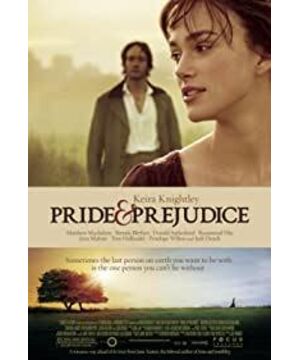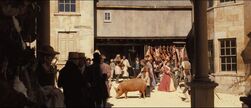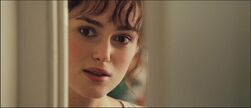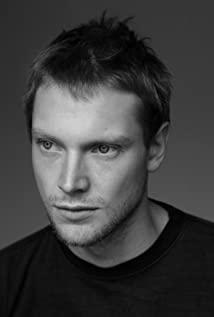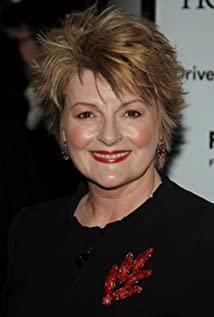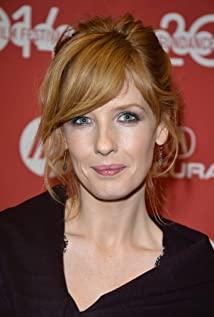First of all, of course, it is about the overall style of the film. As we all know, some enduring literary classics must have a lot of traces of their own national culture, and "Pride And Prejudice" is no exception. Due to Jane Austen's profound British cultural background, and even more due to the general cultural psychology of the British, this novel is almost an exhaustive display of British culture - especially the British middle-class aristocratic culture, whether it is the beautiful countryside of England The scenery and the majestic manor, the elegant dance steps of the gentlemen and ladies, and the complicated and restrained noble etiquette are all factors that cannot be erased in the novel, even more important than the plot, even if readers want to see the love story of Ms Elizabeth and Mr Darcy Gradually unfold, but the most important thing is to see how this relationship develops in the cultural context created in the book, without the cultural context, "Pride And Prejudice" will no longer be "Pride And Prejudice" . But unfortunately, the new version of "Pride And Prejudice" just lacks a lot of necessary cultural roots. The film's planners have added a lot of American cultural elements to such a British classic too casually, especially the infiltration into the greater America. The spiritual view of love makes people feel extremely uncomfortable. This kind of behavior, from the perspective of film appreciation alone, can be said to be a lack of a thorough understanding of British culture and Jane Austen. If it is more serious, this is a kind of cultural aggression. To be complete, elements of the American spirit must be added. I know that few people have such crazy thoughts, but at least this kind of tampering is also a great disrespect for other national cultures. Many things in the film are impossible to appear in the original book. There are many examples here, the most typical of which is the relationship between the Bennet family. The Americans obviously simplified the family relationship of this family. It may be thought that there is only one factor in the family, and that is emotion, but that is not the case with traditional British culture. They ignore the peculiar and even subtle things about British family relationships, such as emotional restraint, such as daily etiquette, which makes the British factor that should have been prominent in the film seem far-fetched, not so much it is An adaptation of a famous British novel, it is better to say that it is a new adaptation of an American. compared to 95
The choice of actors in the film is also unsatisfactory. From the protagonist to the supporting role, there is absolutely no sense of aptitude in the 95 BBC version. Except for Dame Judi Dench's Mrs. De Bourgh, I'd probably give almost all of them an unceremoniously bad grade. Starting from the protagonist, the central character Ms Elizabeth was handed over to the emerging British actress Keira Knightly. In all fairness, Knightly performed very hard, but the score I can give her is not high, at most 70 to 75 points, because Knightly Although he is British, he has made the same mistake as the filmmakers who lack understanding of British culture. I don't dare to say that I understand British culture, but as far as I can understand, the elegant complexity and habitual restraint of British classical culture contains the aristocratic temperament that has almost disappeared in today's society, not afternoon tea. As simple as a curtsy. Jane Austen's Ms Elizabeth is Austen's ideal representative of British female culture. She should have a label that can reflect this. Knightly's performance is obviously lacking because it can't stand such scrutiny. Compared with the 95 version of Jennifer Ehle, although many people commented that she was too old, she was definitely able to suppress the whole play. She showed that Elizabeth was mixed with her age, personality and family background, which was very remarkable. The cultural background makes people sure at a glance that this Elizabeth is closer to the Elizabeth in Jane Austen's book. And Knightly's Elizabeth is more like a high-minded, proud and talented modern girl, and more like a modern American girl (but maybe modern American girls are not much different from British girls? I haven't noticed this, but since According to Harry Potter, there is still a difference). But we can't be too harsh on the young Knightly. I remember an interview a while ago with Colin Firth, who was still filming the 95th edition of "Pride And Prejudice" many years ago. It has been emphasized many times, so this role is indeed a challenge for Knightly's lack of acting experience. Fortunately, she still has a performance that can convince most of the audience, this film is enough to let her get rid of the title of vase.
Speaking of Mr. Darcy, this is indeed an outrageous thing. Matthew MacFadyen surprised me when I first appeared, I never imagined that Jane Austen's Mr. Darcy would have an Adrian Brody-esque American nose, and he didn't have Brody's melancholy, ethereal sexiness , All you can see is the long horse's face and the sadness on the horse's face. Taking a step back, even if Mr. Darcy is really not British enough, so with strict and orthodox gentleman education and ubiquitous cultural environment, his style should always be British, right? The answer MacFadyen gave us was No. I saw more from his Darcy, a kind of overwhelm when he first got involved in the world, and even a little narcissism of the American middle class. I can't believe that this child is still born and raised. of the British. As for the acting, it was a mess. The narration was ambiguous, without cadence and expressionless. In the scene where Darcy proposed to Elizabeth, it was a complete mess. I even thought at the time, no wonder Elizabeth didn't accept him. It looks like there is no sincerity, as if someone forced him. MacFadyen is clearly what an American understands as Darcy, and everything he wants to do is British, hilarious, like dancing and bowing, and looks like a director's marionette; he doesn't seem to be shot head-on Horseback riding shots, but I think if there were, it just made us worry a little more about the last time — about him falling off the horse. Don't want to compare him to Colin, it's just bullying him and playing featherweight at heavyweight. Perhaps MacFadyen's clumsiness has given us an opportunity to reflect. We can understand how unsurpassable Colin's Darcy is, and how much inner discipline and contemplation are required for seemingly physical sports such as dancing, fencing, horseback riding, and swimming. Concentrated cultural immersion. Of course, we can also understand that the reason why Colin's Darcy is Darcy, and the reason why it is the Sex Symbol in the UK, is not as simple as a wet shirt. I'm never a person who speaks too much. Although MacFadyen's performance failed this time, he still seems to have some style and personality of his own, although it is far from the time to play a role like Darcy. It is recommended that young people do something like a low-cost literary film to hone their acting skills, or it is best to find a cover for the old drama and practice hard, maybe it will be more successful than making a big green leaf for Knightly. .
The supporting characters are also unbelievably depressed. The new version of "Pride And Prejudice" almost completely ignores the dramatic traditions of traditional novels, and the choice of supporting characters is not very appropriate. Mr. Bingley looked stupid, not at all like a well-educated English gentleman who could please everyone, earning £5,000 a year, especially when Elizabeth visited Netherfield and exchanged words with Darcy in the living room. The mentally retarded giggle made me want to slap my head to death on the screen; Jane is scary old, I don't understand why the director chose Jane to be Elizabeth's aunt since he chose such a young Elizabeth? Maybe he's to match his goofball Bingley? Jane's quiet, elegant and well-trained character in the original book has disappeared. The real female No. 2 in this book has not left a deep impression at all; Mr. Collins has failed even more. A boring actor came to play this role, and his face was stiff when he spoke, without the image of the clown portrayed in the original work. I really can't see this Mr. How does Collins match Elizabeth's "Most stupid man all over England" in the original book, he seems to be a little dumb, and when he says those disgusting flattery words with an insincere expression, I wonder how Lady De Bourgh would see it Can't come out? It seems that the director wants to rehabilitate Collins, the American is generous; Lydia, thinking that she can show Lydia's pushy and simple-mindedness by jumping twice while walking. , can't even see her face clearly; Ms Bingley, who leans more towards the traditional bad woman image in American movies than in British movies; Mrs Bennet, and the chattering in the original book, annoying all day with neuralgia, almost marrying her daughter. A mother who is irrational is a far cry from her, always looking like a hard-working and submissive housewife, babbling about lines that should have been domineering; Mr Bennet and Donald Sutherland are indeed old actors, and the director must be secretly proud of the choice of this role , but unfortunately, this old man is still too emotional, like an American father. To show that this is not my subjective assumption, I quote a description of Mr Bennet in the original book: "Mr Bennet was so odd a mixture of quick parts, sarcastic humor, reserve, and caprice, that the experience of three-and-twenty years had been insufficient to make his wife understand his character.
Besides a few key plots, this is also a point that makes me extremely dissatisfied, because the traces of Americanization are too heavy. Strange to say, this film always reminds me of "Gone With The Wind" inexplicably. First of all, it is exactly like the dance scene in the film. No matter how you look at it, it looks like a replica of Twelve Oaks and the famous "Dance Montage", although I It's harsh to say that, but it's a clear Americanization. However, the most obvious trace of Americanization is the huge tree on the road from Longbourn to Netherfield - God, it is exactly the same as Tara's tree, and even the silhouette is handled in the same way. The symbol of this pure American spirit is placed in " Pride And Prejudice is really depressing. There was also a conversation between Elizabeth and her parents after she rejected Collins' marriage proposal. The atmosphere changed from a very British lighthearted humor to a very American one. It was originally a joke, but the director wanted to make Knightly cry on the spot; the scene was also moved from the very British study. When I got to the very American lake, I thought Mr Bennet was going to tell Elizabeth "Red Earth of Tara" and so on. Now that America is like this, the ending doesn't really matter - anyway Darcy and Elizabeth haven't had a sweet long kiss before they get married, - wait, insert a word, recently learned about an amazing Outraged at the fact that this kiss actually exists! I saw it on YouTube, and it was added at the end of the European version, more than a minute, the plot is probably: two people are sitting by the lake, Darcy is barefoot and not wearing boots for some reason (do you think you are Colin? Do you think Everyone still wants to see you jumping into the lake for a swim? Tell you, don’t say you climbed out in your shirt, even if you take off your shirt on the spot, no one will pay attention to you), and then the two began to discuss the issue of calling each other in the future, and finally said When it comes to the name Mrs Darcy, Lizzy said that when my dad was angry, he called my mother Mrs Bennet, but you can't, if you want to call me Mrs Darcy, it must be when you are very, very happy. The subsequent episodes made me laugh, MacFadyen began to show his timidity again, in order to show Darcy "Extremely happy", the young man just reluctantly called N many times Mrs. Darcy, that voice sounded like a broken replay machine... Fortunately, this part is only in the American version, otherwise the British who see classics like life wouldn't peel the birdman director. ——Continuing to talk about the topic, the most helpless plot in this film is the first marriage proposal of Darcy, one of the most important scenes. I have just been depressed about MacFadyen's terrible performance here, but it is nothing compared to the American-style romantic elements. Invading British novels mercilessly, raining down aristocratic restraint and etiquette, I still feel that Darcy, who can't even break a sentence, let alone a cadence, is nothing. Super miss Austen's den, restrained fiery, and Colin, "the posh, deep, can't-be-bothered voice that he proposed to Elizabeth Bennet in on the BBC".
Having said so much, I don't plan to go further, even if I want to pick out a lot of faults. In short, the cultural hegemony of Americans is an outrageous thing. No matter which country they have in their hands, the directors and screenwriters first consider the taste of the American people. It seems that as long as this is satisfied, it will be a great success. Those classics raped by American culture have lost their original charm and become four dissimilars without historical value, waiting to be misinterpreted by future generations. If the Americans have always pursued this kind of adaptation idea similar to the chauvinism of the great power, who would dare to feed their own national culture into the mouth of the hungry wolf in the United States in the future?
View more about Pride & Prejudice reviews


